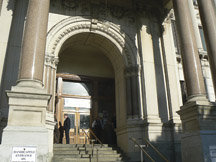It’s two weeks into May, and along with their tax bills for the second quarter, Jersey City homeowners got a brochure explaining that the town will soon reassess their property values for the first time in 22 years – meaning they may have to pay higher taxes starting in 2013.
The revaluation is an appraisal of all real estate in the city to determine its value for taxation. The expectation is that properties will be appraised at or near their current market value.
Since the city has not conducted a revaluation since 1988, and because property values have increased dramatically since then, people with homes that are worth more may have to pay higher taxes. Others may pay less, and others may pay the same. The uncertainty of the outcome is what has property owners worried.
“Where’s the fairness in all this?” – John Seborowski
________
The process may take 18 months. The new assessment value will be applied to tax bills starting on Jan. 1, 2013.
The revaluation is already making residents nervous and angry about their future taxes.
‘Disproportionally affected’
Funmilayo Brown and husband Michael live on Fourth Street in downtown Jersey City in a home her husband purchased in 2000. Brown, whose background is in financial analysis, is now a stay-at-home mom taking care of the couple’s 10-month old daughter.
Brown said when the tax bill and the reval brochure arrived at her house, she had already received her mortgage bill, which includes their taxes, which are about $13,000 per year. Brown said she wished the city would not go through with the reval.
“I was upset because our property taxes have already gone up, about $300 more a month, which is ridiculous,” Brown said. “Now, I am worried about how much more we are going to have to pay with the coming reval.”
Brown feels downtown Jersey City residents are already bearing most of the tax burden in the city, saying they are “disproportionally affected.”
“What services are we getting for such high taxes, like $13,000 a year?” Brown said. “Are you coming into my house to take out my garbage?
Not everyone pays
A 25-year downtown resident, who didn’t want his name used, said last week that he took issue with the city doing the reval because he remembered his taxes “more than doubled” after the 1988 revaluation. He also is irritated that condos whose developers got tax abatement agreements from the city will be not be included in the reval, since the properties are exempted from conventional taxation.
Jersey City has an estimated 160 properties under tax abatements, an arrangement in which the developer or property owner makes an annual payment in lieu of taxes (PILOT) that is a negotiated percentage of their annual revenue. The properties pay the money directly to the city, and there is no separate levy for schools or county taxes. Residents of those buildings aren’t subject to fluctuating property taxes.
The city, in information about the reval on its website, says that abated properties will be subjected to the same process when their abatements expire – but the expiration sometimes takes up to 40 years.
The resident was unimpressed.
“The operative words are, ‘When they go off their abatement,’ ” the unnamed resident said. “These abatements are for 20-30 years.”
And he is not the only one who feels this way about abated properties finding immunity from the reval process.
John Seborowski, a homeowner in the Jersey City Heights for about 30 years, said recently that he doesn’t see million dollar developments with abatements such as the 77 Hudson St. residential building taking a hit from the reval, while the regular homeowner will have to suffer.
“Where’s the fairness in all this?” Seborowski said.
Making an appeal
Barbara Meise owns two four-story buildings on Montgomery Street in downtown Jersey City, across the street from City Hall. Meise, a well-respected artist known for her window restoration work business, Artbuilders, said she was “outraged” by the city’s pursuit of a revaluation.
“I pay $10,000 in taxes a year for each building, and who knows if this reval won’t lead to me paying more?” Meise said.
But Meise said she is not going to panic. Instead, she will wait for the assessment and probably file a tax appeal.
Homeowners who disagree with their new assessment can appeal it with the Hudson County Board of Taxation, which Meise has done successfully three times in past years.
